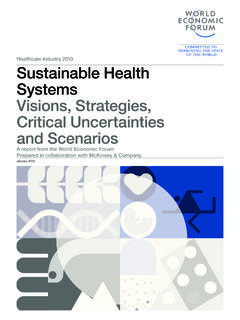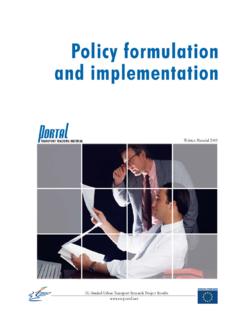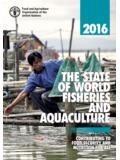Transcription of 200Policy Brief - OECD
1 OECD 2007 organisation FOR ECONOMIC CO-OPERATION AND DEVELOPMENT Policy BriefJANUARY 2007 Improving Recycling MarketsIntroductionSocieties produce ever-growing quantities of solid waste, from packaging to abandoned televisions and cars. Disposing of this waste, often by burying it in landfills or burning it, produces significant soil contamination, as well as air and water pollution. It is particularly important to manage hazardous solid waste safely and way of limiting the scale of the problem is to recycle waste where it is economic to do so. As such, OECD governments are setting recycling targets at increasingly higher levels, and for a growing range of materials. Another reason for recycling for some governments is that it can contribute to sustainable materials management , reducing pressures on natural resource stocks recycling paper and cardboard packaging, for example, not only reduces the number of trees being cut down to produce pulp, but also uses less energy than producing paper using new materials.
2 Recycling is playing a larger role in our economies, at least partly thanks to government incentives. The Bureau of International Recycling (BIR) has estimated that the recycling industry handles more than 500 million tonnes of waste and employs more than million people, with an annual turnover of USD 160 billion. Recycling only makes sense if it is economically attractive and that means recycling markets must function properly. What kind of barriers and failures are recycling markets facing and how can they be overcome? This Policy Brief looks at how recycling markets have developed and what government can do to encourage continued growth in recycling and use of recycled materials. How do recycling markets work?
3 How can search and transaction costs be reduced?Can better information help buyers avoid lemons ?Can consumers be persuaded to buy products manufactured from recycled waste?What is the role of product design in encouraging recycling?How can public authorities ensure competition in recycling markets? How can recycling markets be made more efficient?For further informationFor further readingWhere to contact us?2 OECD 2007 Policy BriefIMPROVING RECYCLING MARKETS Governments use a wide variety of measures to promote recycling, such as public collection schemes for waste paper, deposit-refund systems for used gas containers, take-back programmes for used batteries, or product standards imposing a minimum level of recycled content.
4 And recycling is clearly on the rise (see Figure 1). Policy measures to encourage recycling, however, will only meet with limited success if the markets for recycled products are not functioning well. Governments are constantly asking for a greater proportion of goods and materials to be recycled, but the cost of meeting these targets is determined to a large extent by the marketplace. Unfortunately, there is some evidence that markets for some recyclable materials are subject to important failures and barriers, and this can be costly. For one thing, inefficient markets are frequently subject to price volatility. As Table 1 shows, price volatility for recyclable materials is generally greater and in some cases five times greater than price fluctuations for virgin materials which are close substitutes.
5 This price volatility leads to uncertainty, and can discourage investment, thus undermining the financial viability of recycling. Five issues have been identified as potentially significant barriers and failures in markets for recyclable materials: search and transaction costs; information failures; consumer perceptions and risk aversion; technological externalities; and market power. But what can governments do to overcome the barriers to recycling markets, which in turn may help the markets function better and thus reduce price volatility? How do recycling markets work?Figure 1. INDEX OF PRODUCTION (VOLUME) OF THE RECYCLING SECTORS ource: OECD STAN Industrial 70197219 7419 7619 78198019 8219 84198619 8819 9019 9219 94199619 982000 Denmar kFinlan dFr anc eAustri a OECD 2007 3 IMPROVING RECYCLING MARKETS Policy BriefIt can be difficult for buyers of recyclable waste to find sellers of waste, and vice versa.
6 These search costs are common to all markets, but they may be particularly high in markets for recyclable materials. Unlike most other manufacturing or service sectors, suppliers are not easy to find or grouped in one area or even industry, since recyclable textiles, paper, plastics, etc. are spread across industries, households, and geographical areas. Predicting how much recyclable material will be available, and when, is also difficult, since it is by its very nature the by-product of other decisions. For instance, the amount of scrap metal available from cars depends on how many cars were produced in the first place, and the rate of turnover of the vehicle stock. So recyclers may incur significant costs just in identifying suppliers of recyclable material.
7 In addition, the quality of material being offered for recycling can vary widely, making it difficult to value and this can result in significant costs for buyers and sellers in agreeing on a price. These transaction costs are likely to be even more difficult in cases where the waste is mixed (paper, plastics, etc.) or where the characteristics of the waste are not easily detectable or visible. In such cases, each shipment is unique and buyers and sellers must negotiate a fair price. Public authorities have often tried to reduce search costs by making it easier for buyers and sellers to find each other. A large number of local authorities in OECD countries publish lists of potential counterparts for both buyers and sellers of recyclable materials.
8 In other cases, public authorities support the use of websites for exchanges for construction and demolition waste in Austria and aggregates in the United can search and transaction costs be reduced?Table 1. STANDARD DEVIATIONS OF MONTHLY PRICE CHANGES FOR SELECTED PRIMARY AND SECONDARY MATERIALS Textiles Processed yarns and threads Natural Lead and zinc Copper Iron (Jan. 1993-Feb. 2003) : United States Bureau of Labour Statistics ( ).4 OECD 2007 Policy BriefIMPROVING RECYCLING MARKETS Public authorities have also sought to reduce transaction costs once buyers and sellers have been able to contact each other. In Korea, a monthly Market Survey on Recyclable Materials provides information to 1 000 subscribers on prices and trends in markets for waste paper, synthetic resins, glass bottles, metal cans, and used tyres.
9 In addition, grading and certification schemes can help to commodify heterogeneous waste. Austria s Compost Ordinance specifies three grades of compost, designed to reduce the space for negotiation. This is also common for wastepaper and metal scraps. And finally, dissemination of standardised contracts may also help to reduce transaction costs. The Netherlands has recognised the value of this with respect to recyclable construction materials, as has the United Kingdom in the area of wastepaper. In addition to uncertainties about waste quality which increase transaction costs, buyers may also have difficult in determining whether waste materials contain contaminants which will have to be removed before recycling.
10 For example, buyers of waste lubricating oils can never be certain that they are free of certain contaminants (heavy metals, polychlorinated biphenyls, halogens or even water), which will make re-refining more difficult. The presence of even a small amount of PVC (polyvinyl chloride) in mixed plastic waste can make an otherwise valuable shipment worthless. If sellers believe that the contaminant will not be detected, they will not worry about the negative effect on their reputation of selling worthless materials. This can result in a downward spiral in the quality of waste placed on the market. In addition, if buyers have doubts about the quality of the waste they are buying, the waste may not be recycled for its highest potential value-added use.
















![-:HSTCQE=V]ZUVW: 20 2012 08 1 P - oecd.org](/cache/preview/7/2/d/a/9/f/9/f/thumb-72da9f9fb260ce23f17d3cca6cdecbc1.jpg)